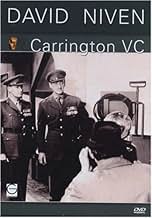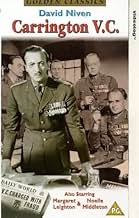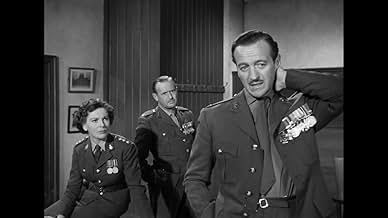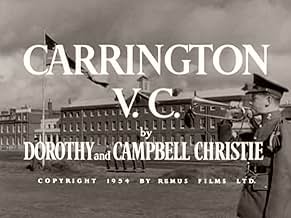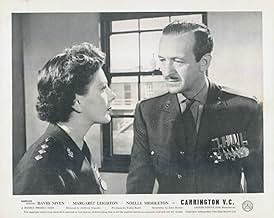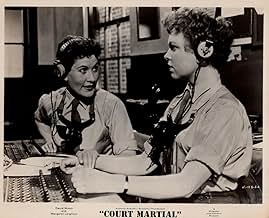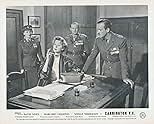Ajouter une intrigue dans votre langueA court-martial attempts to find out why, and if, an officer embezzled his unit's funds.A court-martial attempts to find out why, and if, an officer embezzled his unit's funds.A court-martial attempts to find out why, and if, an officer embezzled his unit's funds.
- Réalisation
- Scénario
- Casting principal
- Nomination aux 5 BAFTA Awards
- 5 nominations au total
Avis à la une
Major Charles Carrington (David Niven), is arrested for taking £125 from the base safe, he also face two other charges that could finish his distinguished service career. He decides to act on his own defence at his court martial hearing, his argument being that he is owed a lot of money from the army for his various postings that have cost him out of his own pocket. To further complicate the proceedings, Carrington alleges he told his superior, the very disliked Colonel Henniker, that he was taking the money from the safe. A mans career, his marriage, and quite a few reputations, all hang in the balance.
Yes, well it is very British, of that there is no denying, it's very much heel to toe, cup of tea and chin chin chin. So with that in mind {i'm British myself by the way} this may grate on film viewers outside of the British Isles, but it's a really honest and interesting piece that scrutinises the British Court Martial system and rewards the court genre fans royally. Niven is, well Niven, he's always a solid professional who always earned his pay, and good support comes from the ladies of the piece, Margaret Leighton and Noelle Middleton, whilst i must give a mention to the seriously great Victor Maddern, an actor who was far from the A list of British greats but once you put the name to the face, you will see he was always memorable in what films he made.
So as a court room genre fan, and of course a staunch fan of British cinema, i'm going to rate 7/10 with a disclaimer that if those outside of my shores don't get it....well you just don't get it, {nudge nudge wink wink}.
Yes, well it is very British, of that there is no denying, it's very much heel to toe, cup of tea and chin chin chin. So with that in mind {i'm British myself by the way} this may grate on film viewers outside of the British Isles, but it's a really honest and interesting piece that scrutinises the British Court Martial system and rewards the court genre fans royally. Niven is, well Niven, he's always a solid professional who always earned his pay, and good support comes from the ladies of the piece, Margaret Leighton and Noelle Middleton, whilst i must give a mention to the seriously great Victor Maddern, an actor who was far from the A list of British greats but once you put the name to the face, you will see he was always memorable in what films he made.
So as a court room genre fan, and of course a staunch fan of British cinema, i'm going to rate 7/10 with a disclaimer that if those outside of my shores don't get it....well you just don't get it, {nudge nudge wink wink}.
This is quite a decent military court-room drama in which David Niven finds himself accused of pinching a large sum from his battalion funds. At the ensuing court martial, he must answer the charges relying on his honesty and integrity - he has a V. C. after all - and on receiving, somewhat naively, a reciprocal degree of honesty and integrity from others. It's quite a neat little story about revenge and snobbery; tempered with the odd bit of human decency and Niven is ideal for the part. Margaret Leighton is also quite good as his rather aloof wife and Allan Cuthbertson as his supercilious commanding officer "Col. Henniker" who clearly both have axes to grind. The ending isn't great, but otherwise it is a simple story well told.
Major David Niven V.C. is up on charges. Two are minor, but the third one can break him, and possibly sent him to prison: that he surreptitiously took 125 pounds from the company safe. His defense is that he was owed the money, which no one denies, and that he told his Commanding Officer that he was going to do it. He told his wife, Margaret Leighton so over the phone; he also told fellow officer Noelle Middleton he had told his C.O. However, the C.O., Allan Cuthbertson, denies it. This being David Niven at the peak of his career, the movie is clearly slanted in Niven's favor, although the evidence presented to the Court is not. That's a necessary part of the dramatic tension.
Anthony Asquith directs this to bring out the ritual nature of Army life. The performances vary between those ritualized interactions, and things said in private in a very engaging fashion.
Asquith had begun his directing career in the silent era with a bang, with two late silent stunners, SHOOTING STARS and UNDERGROUND. Then something happened to his career in the mid-1930s. When he returned to directing in 1938, he specialized in films derived from stage works by Shaw, Rattigan and Oscar Wilde. The performances he got for these first-rate properties were wonderful, but they certainly seemed more staged plays than movies.
Although this movie is an original screenplay, it very much seems an opened-out play. Certainly, it is a a fine adaptation, but it would have taken little work to convert its borders to a proscenium arch. Despite this, it is a fine story with excellent performances all around.
Anthony Asquith directs this to bring out the ritual nature of Army life. The performances vary between those ritualized interactions, and things said in private in a very engaging fashion.
Asquith had begun his directing career in the silent era with a bang, with two late silent stunners, SHOOTING STARS and UNDERGROUND. Then something happened to his career in the mid-1930s. When he returned to directing in 1938, he specialized in films derived from stage works by Shaw, Rattigan and Oscar Wilde. The performances he got for these first-rate properties were wonderful, but they certainly seemed more staged plays than movies.
Although this movie is an original screenplay, it very much seems an opened-out play. Certainly, it is a a fine adaptation, but it would have taken little work to convert its borders to a proscenium arch. Despite this, it is a fine story with excellent performances all around.
Carrington, VC finds career army officer David Niven doing something reckless and
a bit stupid besides. He borrows a bit of money from the Officer's Fund of his
unit to pay some household bills. He's owed a lot of back pay allowances that
the fine military machine of the British army hasn't seen fit to cough up. But he
is a winner of the Victoria Cross, the VC of the title and the commander of the
regiment Allan Cuthbertson is a most jealous man. He might be the head of the
regiment, but the men look to Niven.
If you remember the Clint Eastwood film Heartbreak Ridge at one point Gunnery Sergeant Eastwood helps out one of his enlisted men make ends meet the way Niven is having problems with his wife and family. But officers don't have concerned gunnery sergeants.
In any event Niven is being court martialed for the offense, charges brought by Cuthbertson. How it goes I will not say, but Niven is given a royal kick in the keester by a jealous wife Margaret Leighton who suspects some hanky panky going on with a female officer and her husband.
The great critique by me and others is that David Niven more than any other actor had to carry a lot of mediocre films on the strength of being debonair and charming. Not so in Carrington, VC, this is a fine military courtroom drama that stands on its own merits. Niven does well in the lead and grateful for this being a film he didn't have to carry.
Allan Cuthbertson is one of those actors who just does well in everything he's cast in. He's quite the martinet and jealous of Niven's war service and decoration. He spent the war directing a shore battery that was called upon to shoot down Mr. Hitler's Luftwaffe planes, no chance for medals or glory there.
The second member of the supporting cast who is outstanding is Victor Maddern playing Niven's sergeant and biggest fan.
Carrington, VC has a bit of The Caine Mutiny and some of The Winslow Boy in its plot and presentation. But it's a good courtroom drama and all actors love doing them.
If you remember the Clint Eastwood film Heartbreak Ridge at one point Gunnery Sergeant Eastwood helps out one of his enlisted men make ends meet the way Niven is having problems with his wife and family. But officers don't have concerned gunnery sergeants.
In any event Niven is being court martialed for the offense, charges brought by Cuthbertson. How it goes I will not say, but Niven is given a royal kick in the keester by a jealous wife Margaret Leighton who suspects some hanky panky going on with a female officer and her husband.
The great critique by me and others is that David Niven more than any other actor had to carry a lot of mediocre films on the strength of being debonair and charming. Not so in Carrington, VC, this is a fine military courtroom drama that stands on its own merits. Niven does well in the lead and grateful for this being a film he didn't have to carry.
Allan Cuthbertson is one of those actors who just does well in everything he's cast in. He's quite the martinet and jealous of Niven's war service and decoration. He spent the war directing a shore battery that was called upon to shoot down Mr. Hitler's Luftwaffe planes, no chance for medals or glory there.
The second member of the supporting cast who is outstanding is Victor Maddern playing Niven's sergeant and biggest fan.
Carrington, VC has a bit of The Caine Mutiny and some of The Winslow Boy in its plot and presentation. But it's a good courtroom drama and all actors love doing them.
The major theme of this film is the role of the war hero in a peacetime army. Carrington is an undoubted hero but the rule-breaking qualities that made him a hero are not welcome in a peacetime army where bureaucratic procedures are the norm, represented in this film by Henniker, Carrington's commanding officer and an unbending stickler for the rules. So, Carrington is romantic but wrong and Henniker is dull but right. The film, filled with great ensemble acting performances, invites you to choose which you prefer. At the time the film was made, Germany had emerged from the ruins of war with Europe's most dynamic economy whereas Britain, the victor, was mired in post-war decline. Carrington was the dashing war hero but Henniker is in charge now. Henniker, who avoided action in the war, with his Germanic name and blond hair. There's a nice metaphor here. Britain won the war, but who won the peace?
Le saviez-vous
- AnecdotesThe VC worn by David Niven was a genuine medal borrowed by the studio. It belonged to Arthur Henry Cross VC, Machine Gun Corps (Camberwell).
- GaffesA British court-martial appeal does not allow new evidence, as it is not a retrial of a case, but a trial of the trial itself, to argue improper procedure or other problems with the trial.
- Citations
Major Broke-Smith: What's he like?
Lt. Col. Reeve: Henniker? Proper bastard if you ask me.
- ConnexionsRemade as ITV Play of the Week: Carrington V.C. (1960)
Meilleurs choix
Connectez-vous pour évaluer et suivre la liste de favoris afin de recevoir des recommandations personnalisées
- How long is Court Martial?Alimenté par Alexa
Détails
- Durée
- 1h 46min(106 min)
- Couleur
- Rapport de forme
- 1.37 : 1
Contribuer à cette page
Suggérer une modification ou ajouter du contenu manquant

